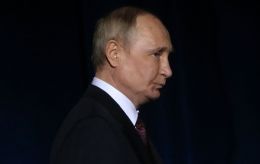'I fight for those who can't anymore': Women's frontline stories of 47th Magura Brigade
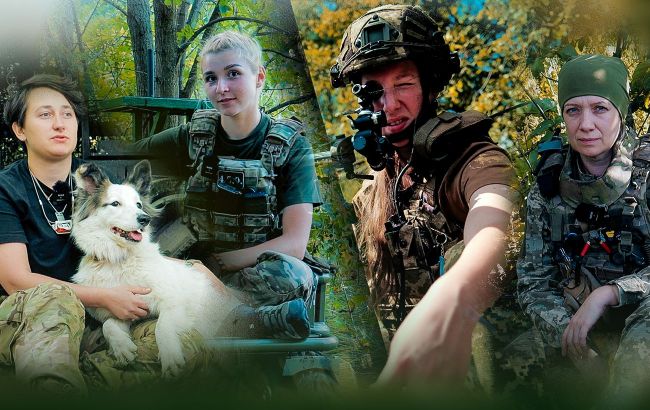 Women on the front lines in the 47th Brigade Magura (collage by RBC-Ukraine)
Women on the front lines in the 47th Brigade Magura (collage by RBC-Ukraine)
The war in Ukraine is changing perceptions of the role of women in the military. Over 70,000 Ukrainian women wear epaulettes, and about 5,500 serve in combat positions. The 47th Separate Mechanized Brigade Magura comprises hundreds of women, each with her own path to the military. RBC-Ukraine reports on four stories: a combat officer call-signed Magura, a mortar operator call-signed Kosa, a combat medic call-signed Liuksa, and a drone spotter call-signed Ostara.
Varvara, call sign Kosa: from kitchen to mortar
When the Russian full-scale invasion of Ukraine began, Varvara was a student. She had been working and studying abroad for several years. Many people tried to convince her to return and live a peaceful life thousands of kilometers away from the war. But she knew that she wanted to build her future in Ukraine, and that the only way to do so was to first fight for peace.
"On February 24, I finally realized that I had to be in the army. I had a feeling that I wanted to live on my own land. I had lived abroad. Everyone told me to apply for residency, that I had forgotten about this place. But I returned to Ukraine because I wanted to live here and raise my children here, in Ukraine. And, of course, it seems logical to me that if I want to live here, raise my children here, as Ukrainians, not as mankurts, then where else can I go but the army?" Kosa shares her thoughts.
At the beginning of Russia's full-scale invasion of Ukraine, it was not so easy for women to join the army, especially in a combat position. Eventually, Varvara saw an advertisement for recruitment into what was then the 47th regiment. It stated that they would accept everyone regardless of gender — the main thing was desire and skills.
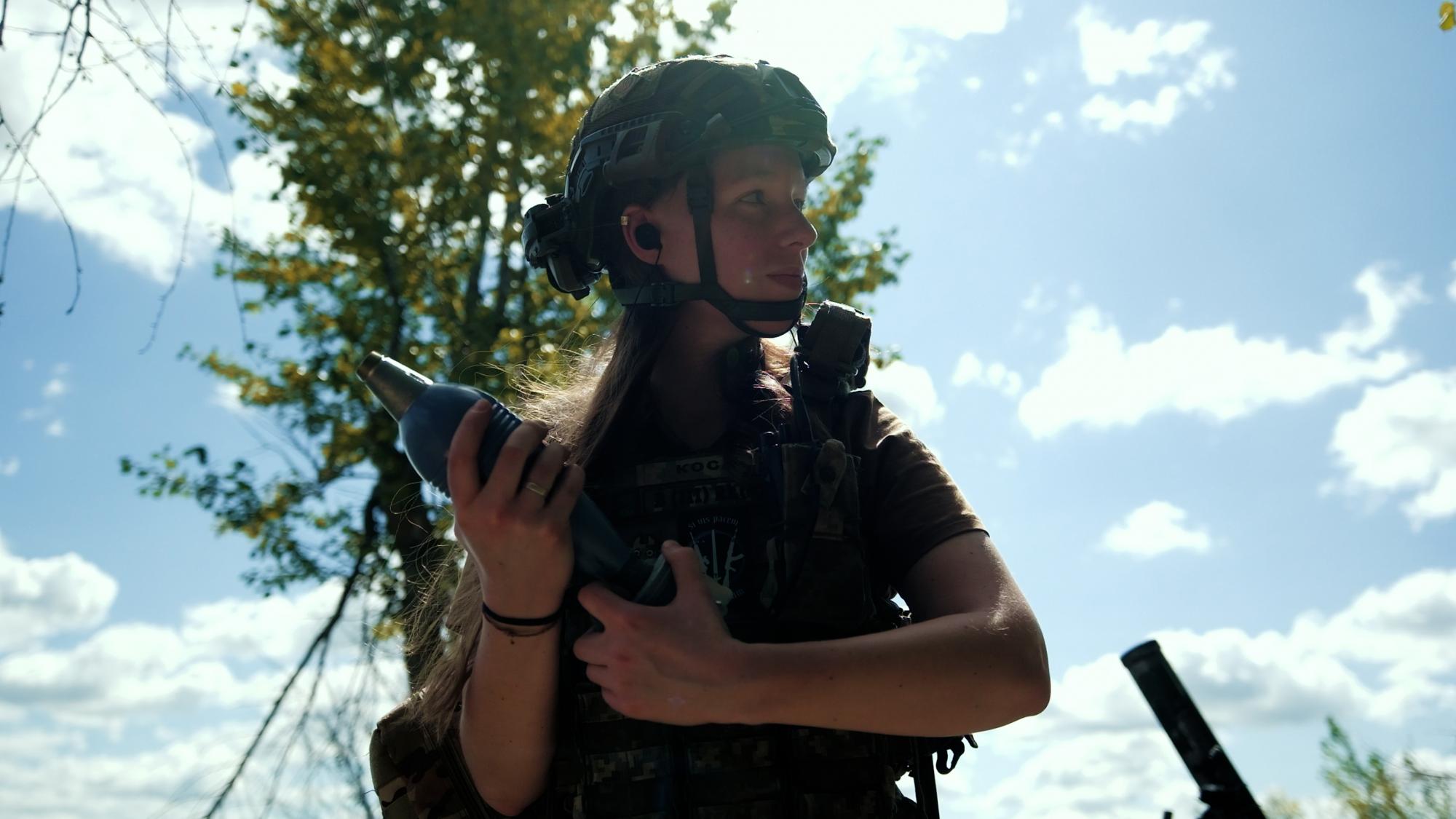 Before the war, Varvara studied and worked abroad, but she returned home to defend Ukraine (photo: RBC-Ukraine)
Before the war, Varvara studied and worked abroad, but she returned home to defend Ukraine (photo: RBC-Ukraine)
"I was preparing specifically for the army. I had a lot of things with me, and a backpack. There were various camping and hiking items. I was ready, spent a couple of days seeing everyone I wanted to see, packed my things, got on the bus, and went to the unit," recalls Varvara.
In the end, the girl passed the interview and was assigned to be a self-propelled gunner. It was a pretty good fit for her, since she had a math background, and working with calculations wouldn't be hard for her. But Varvara never got to work with the self-propelled gun.
"At the unit, they looked at me as if I were crazy when I told them that I had come to show that I was a self-propelled gun gunner. They said, ‘Will you go to the mortar unit?’ I said, 'Well, I guess I'll go to the mortar unit.'"
The path to combat was very thorny. During the counteroffensive in Zaporizhzhia, Varvara and another girl were sent to work in the kitchen, which shattered her hopes, because Kosa understood that she was capable of much more. And Varvara managed to prove her persistence.
"I went up to the senior sergeant and said, ‘Sergeant, how long am I going to sit here? You're not going to put me in a combat group. Why?’ At first, he laughed, but in the end, he gave in. He put me on the list, and I went on a combat mission with a machine gun in my hands. I'm standing in line with the guys and thinking, ‘Did this really happen?’," the girl recalls with a smile.
Kosa's first sortie was with a group of infantrymen. They were there as backup in case of a breakthrough, as heavy fighting was ongoing in the Zaporizhzhia direction. The group took up position in a half-ruined school on a hill. Varvara recalls that it was about 200 meters from the well-known Inter position.
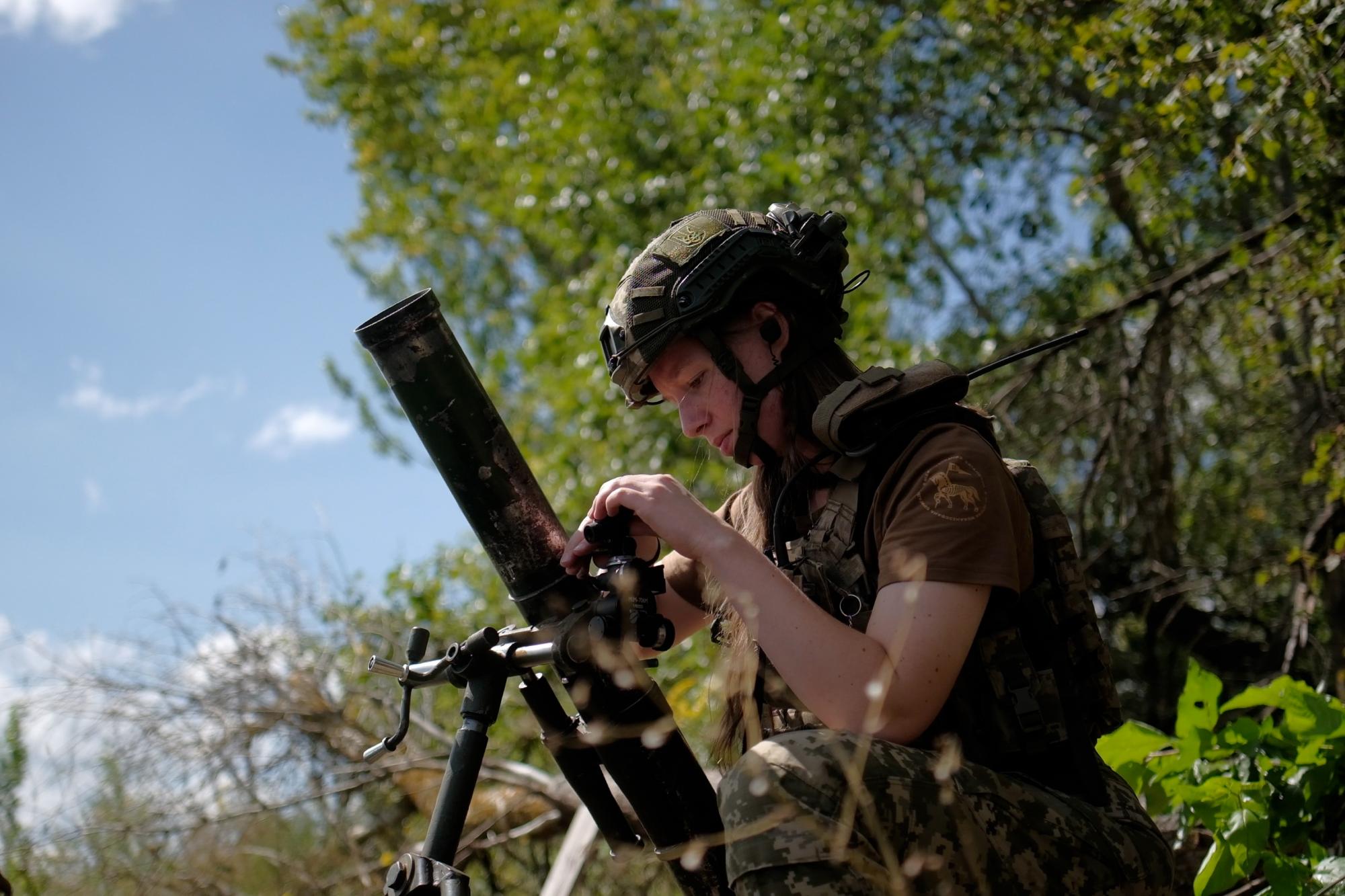 After being redeployed to the Donetsk region, Kosa was finally offered a position in her specialty—in a mortar crew (photo: RBC-Ukraine)
After being redeployed to the Donetsk region, Kosa was finally offered a position in her specialty—in a mortar crew (photo: RBC-Ukraine)
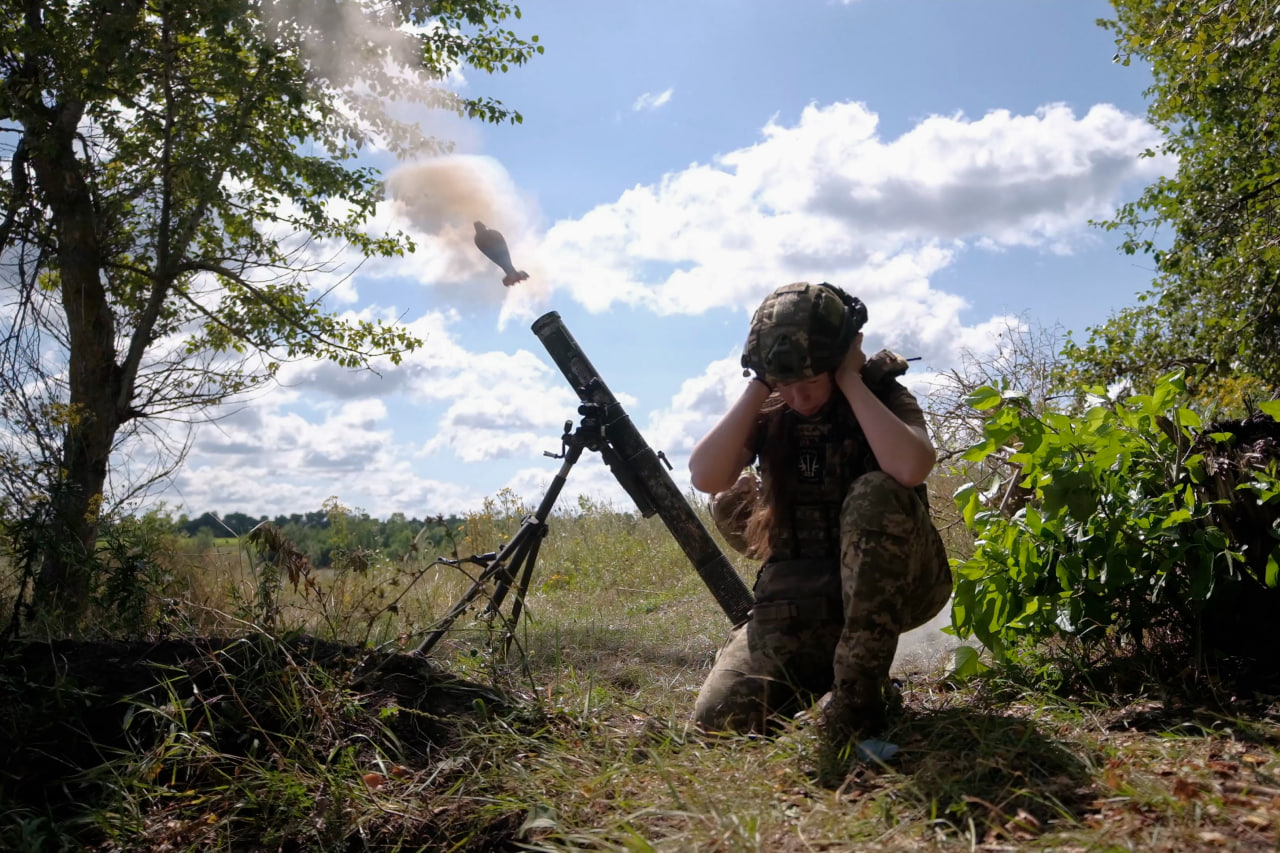 After being redeployed to the Donetsk region, Kosa was finally offered a position in her specialty—in a mortar crew (photo: RBC-Ukraine)
After being redeployed to the Donetsk region, Kosa was finally offered a position in her specialty—in a mortar crew (photo: RBC-Ukraine)
"Our task was to make sure that our position at the school, 200 meters away, did not become zero. At that time, there was a real prospect of a breakthrough, because there was fighting at Akhmat-Posadka. And if things went badly, we had to be ready to act from our firing point. The school was on the southern edge of the village. And beyond that, there was just the landing zone and the Russians. There were attacks 24/7. Everything was flying. Shells from tanks were flying, anti-tank grenade launchers were flying. Grads were firing, guided aerial bombs were flying at Orikhiv, and a sniper was working. Bullets were whistling," says Kosa.
Later, the 47th Mechanized Brigade was redeployed to the Donetsk direction, and there, the girl was finally offered a job in her specialty, and she was transferred to a mortar crew.
"On my birthday, the commander of one of the crews wrote to me. He asked if I would go with them. I was sick at the time. I understood that I was being given a chance. And here's the thing: women are constantly being tested. I understand that I have no choice, because my entire reputation depends on my "of course, I'll go" answer. And, of course, I went," says Varvara.
The girl recalls that she was still a novice at the time, mostly laying mines and training both on combat days and on days off, so as not to be worse than the others and to perform well in combat.
"We trained in Myrnohrad, right in the garden. We ran with the mortar, moved it back and forth, and learned to work together. We trained intensively for several weeks, changed roles, and then left for the Ocheretyne and Berdychiv areas. Now, unfortunately, this is deep behind Russian lines," says Varvara.
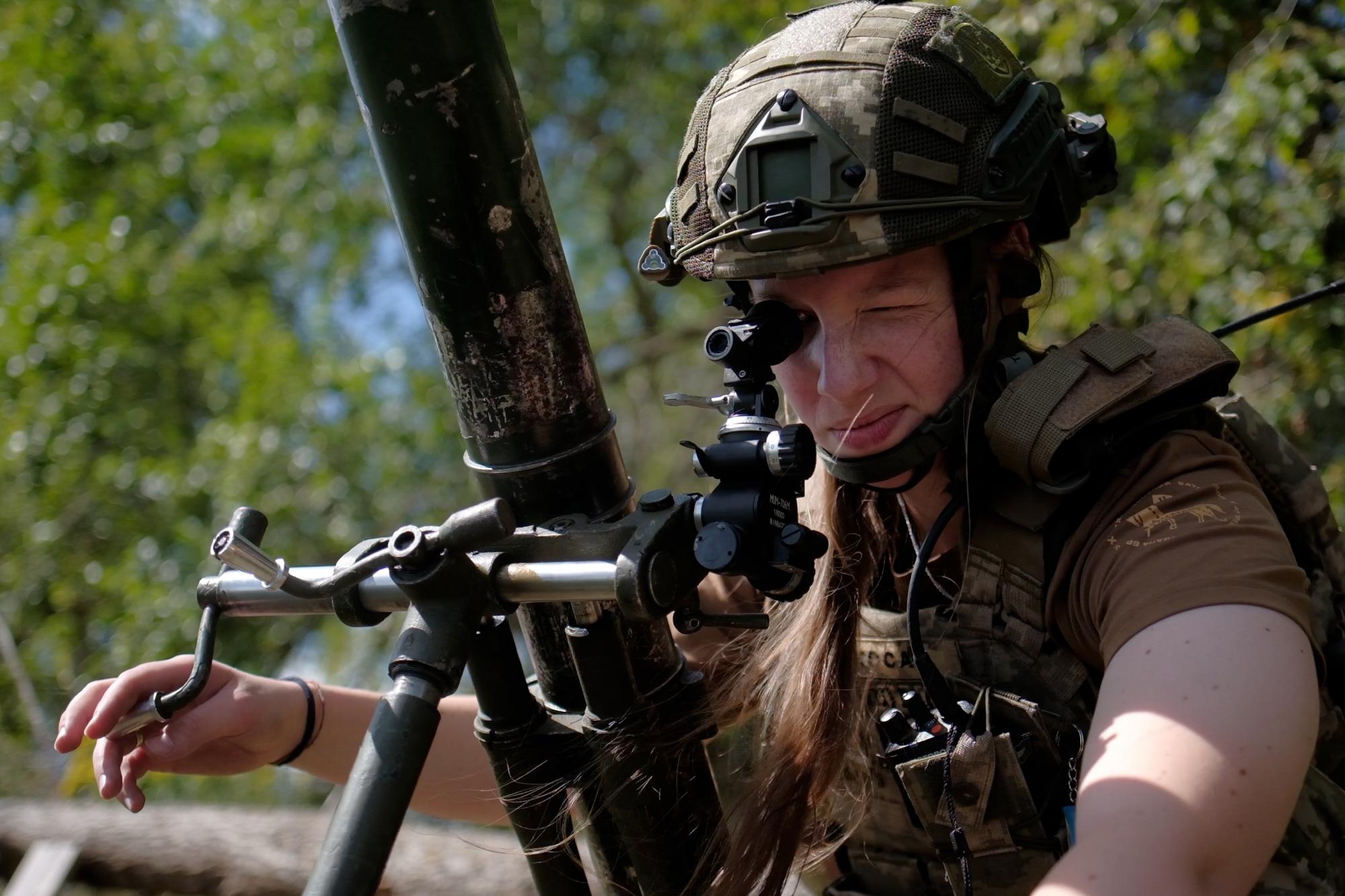 The girl studied hard because she wanted to work as well as the others (photo: RBC-Ukraine)
The girl studied hard because she wanted to work as well as the others (photo: RBC-Ukraine)
Dzvenyslava, call sign Magura: from medic to combat officer
Dzvenyslava got her call sign, Magura, even before she joined the brigade of the same name. She is an architect by training and had nothing to do with the military before the war began. But that did not prevent her from joining the defense of the country. However, like Varvara, it was not easy for her in 2022.
"In the first week, I tried several times to join the local Territorial Defense Forces or some other units, but they were not happy to see women, especially in Lviv, where there were plenty of men with combat experience," recalls Magura.
Dzvenyslava did not give up trying to join the army, and eventually came across an advertisement from the 47th. It's the right time to go, the girl thought then.
"I immediately wanted to serve in combat positions, but that was purely intuitive. I didn’t know what position I could fill. At that moment, I just wanted to be accepted. The only thing I said was that I really wanted to be in a combat unit. And I was accepted as a medic at that moment," says Dzvenyslava.
She vividly remembers her first combat mission as a combat medic. It was during a counteroffensive in the Zaporizhzhia direction, and the fighting was fierce. The Russian positions were very close, separated only by a single asphalt road. Those Russian positions had to be stormed.
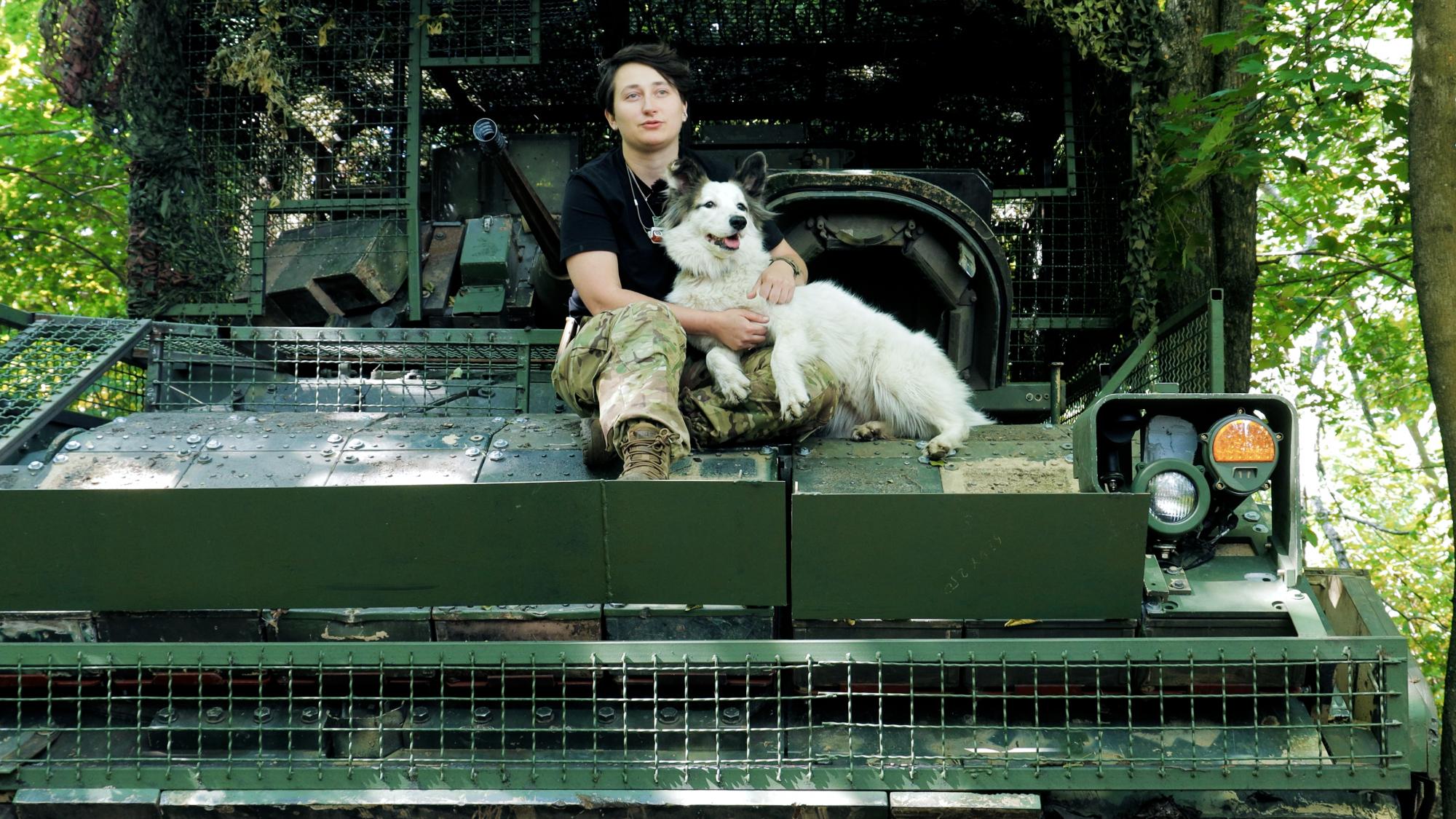 Magura received this call sign even before she began serving in the brigade of the same name (photo: RBC-Ukraine)
Magura received this call sign even before she began serving in the brigade of the same name (photo: RBC-Ukraine)
"Before we even reached the line of demarcation, most of our vehicles were blown up and damaged before they reached the asphalt. We started to rush out of the damaged vehicles. And the infantry began to scatter across the field because we were being actively targeted with cluster bombs, mortars, and artillery. They were waiting for us, and everything started to work against us. I've probably never seen such fireworks before," says Dzvenyslava.
The girl recalls that her first day on the front line seemed to last an eternity. Although the fighting itself lasted only a few hours, time passed very slowly in such conditions. And even though the Russians withdrew, they left behind heavily mined areas, which caused serious injuries to the soldiers.
"The first wounded people who came to me had very serious amputations. Some had lost one leg, some had lost two, and some had lost arms. I had to react very quickly. The hardest thing was that the first seriously wounded person brought to me was my friend. He was in such a serious condition that I was afraid he wouldn't make it. He had lost a lot of blood. He was delirious and could barely speak. I was stunned for a couple of seconds when I saw him. But then, two other medics and I helped him and other seriously wounded soldiers and sent them on for evacuation. I think that after that, I stopped being afraid of any injuries," says Magura.
Dzvenyslava continued to serve as a combat medic for some time, saving her comrades under fire. She later became the commander of an armored vehicle and now holds the position of combat officer at a command and observation post. Her work ensures clear communication between units and, in fact, the lives of people on the front lines. She admits that the hardest part is hearing about the dead and wounded over the radio.
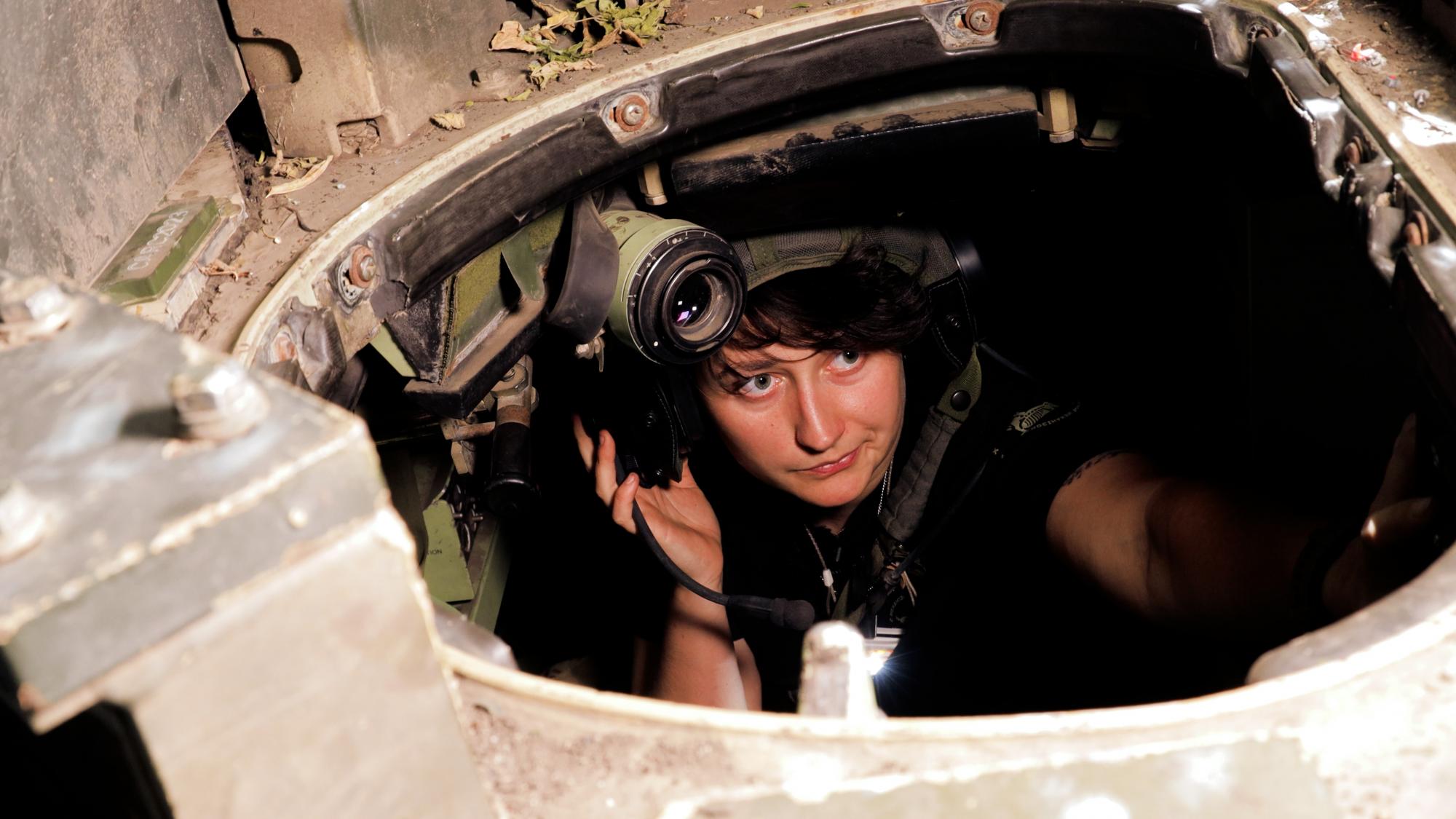 After serving as a combat medic, the girl eventually became the commander of an armored vehicle (photo: RBC-Ukraine)
After serving as a combat medic, the girl eventually became the commander of an armored vehicle (photo: RBC-Ukraine)
"I was a combat medic for a long time. I was there and tried to help those who were in bad shape. That's why it's very difficult for me now to hear on the radio when something is happening there and understand that I do not influence it," explains Magura.
Dzvenyslava herself was in some pretty dangerous situations when the risk was too great. She also held the position of commander of a Bradley armored vehicle. At that time, the front line began to move from Avdiivka closer to Pokrovsk, and the number of Russian strike drones that constantly hunted Bradley increased. The Russians launched an active breakthrough, and the girl's crew was transporting soldiers for rotation when something hit them. Immediately, the internal communication and radio with the command stopped working.
"We realized that we were on fire with the gunner. Flames began to rise from under our feet. Smoke filled the vehicle, and it became difficult to breathe. We tried to shout to our mechanic-driver to stop so we could get out. And when we stopped, my hatch jammed. The smoke was increasing, and there was nothing to breathe. Eventually, my gunner got out. I felt that he was gone and realized that I could climb out through his hatch. But during those few seconds when I couldn't get out through my hatch, I panicked a little because I was suffocating. That was probably the only scary moment," recalls Dzvenyslava.
After years of experience in the military, Magura sees her work as not only a managerial function, but also a moral responsibility. She believes that an officer at the command and observation post must keep everyone on their toes. When someone panics or loses their bearings, they must be guided, calmed, and helped as much as possible.
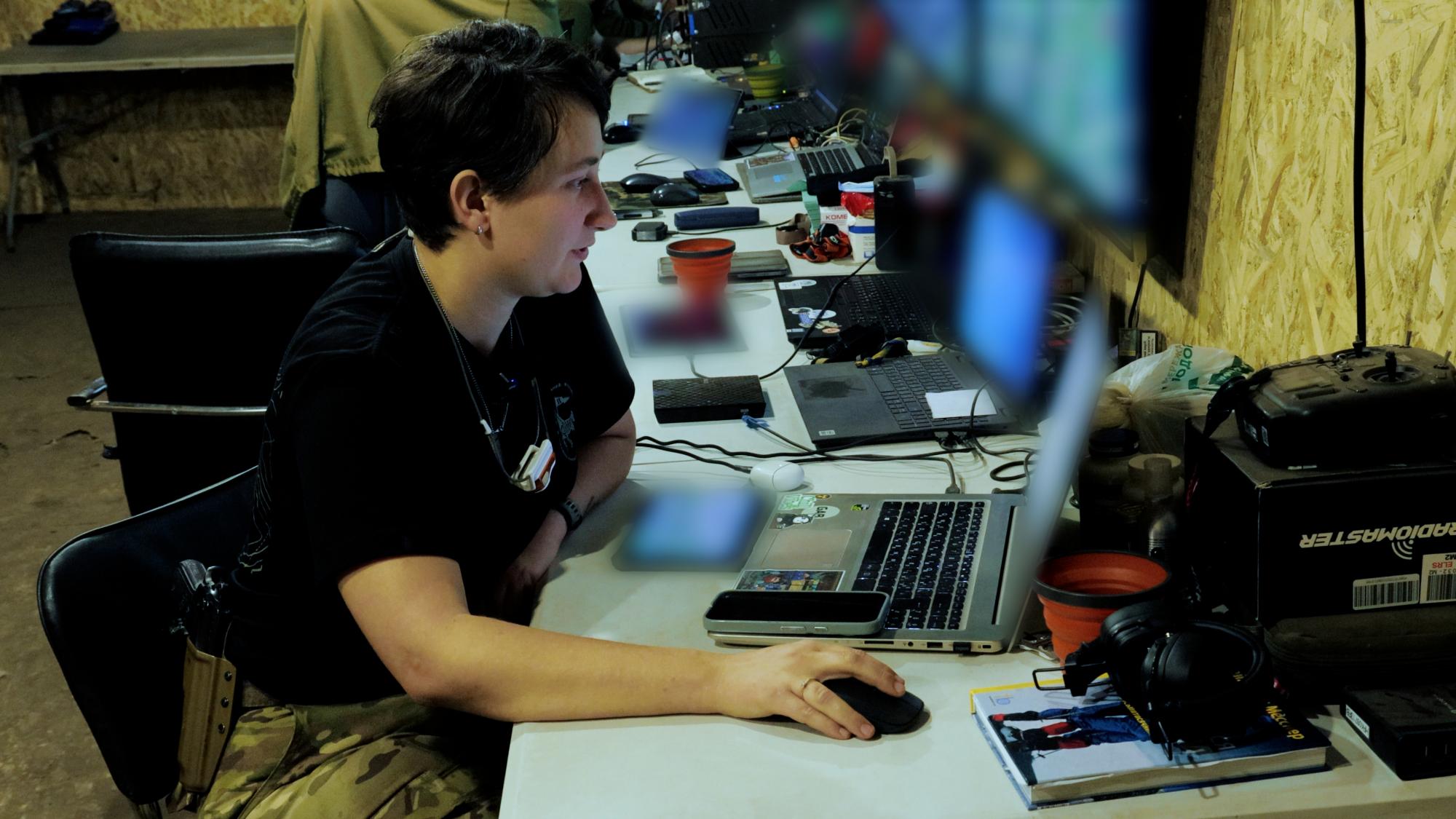 Magura currently holds the position of combat officer at the command and observation post (photo: RBC-Ukraine)
Magura currently holds the position of combat officer at the command and observation post (photo: RBC-Ukraine)
Nataliia, call sign Ostara: drone spotter
Nataliia joined the army a year ago. Before the war, she was raising her children, but now she works in a combat drone unit. She equips drones with ammunition and accompanies the crew on combat missions.
"I decided to join the army a long time ago. Circumstances just happened to be such that I had to wait until my younger daughter grew up. And so I decided for myself that I was already a grown woman, I had already done my maximum for society, my children were grown up, and I could now do something for the state. That's why I decided to join the army," says Ostara.
Before joining the army, she trained as a sapper at the interregional center of the State Emergency Service of Ukraine. Accordingly, she wanted to work in the army as a sapper, because she already had a certain profession and knowledge. But many people discouraged Nataliia from joining the army, citing her age and physical condition.
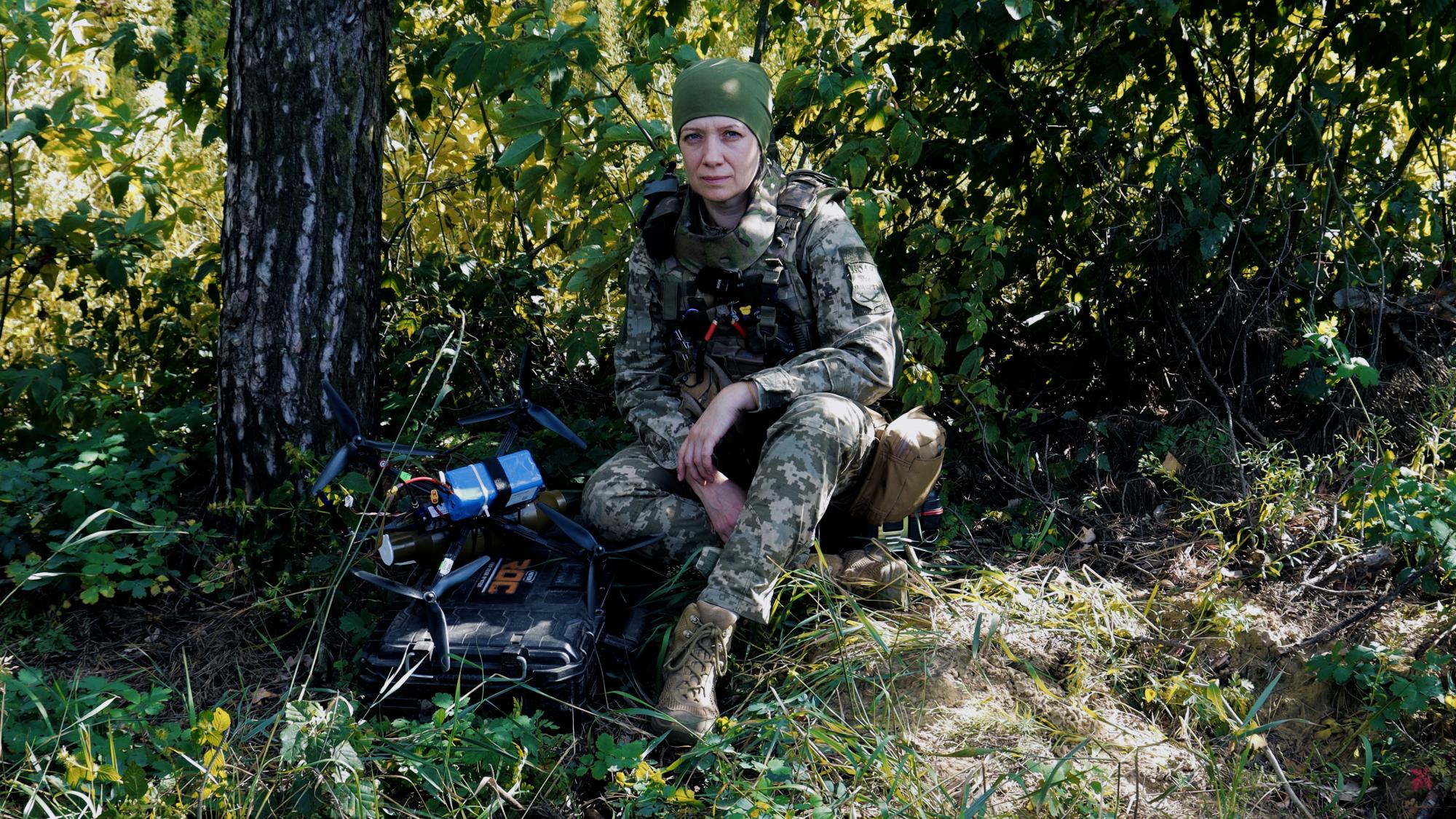 Before the full-scale war, Nataliia was raising children, but then she decided to join the drone combat group (photo: RBC-Ukraine)
Before the full-scale war, Nataliia was raising children, but then she decided to join the drone combat group (photo: RBC-Ukraine)
"For some reason, we believe that men are more capable of fighting than women. But in reality, this is not the case. It is very, very wrong. I went to the military registration office even before signing the contract and asked them to take me somewhere. But they laughed at me and told me to go home because there was nothing for me to do there," Nataliia recalls.
Ostara did not stop. She believed that she would be able to find a brigade that would take her for a combat position, so she continued to prepare for the army.
"All the brigades called and asked questions. I spoke with the commanders, and everything was great, but they said, ‘You're a woman.’ For some reason, we have such stereotypes. Then a representative of the 47th Brigade called me and offered me a position as a spotter in a combat group. I agreed, so that's how I joined the army," she says.
Ostara's task is to equip suicide and FPV drones with ammunition and explosive devices. The woman says that she and her comrades live as one family. Nataliia treats most of the guys like her own children and always tries to take care of them as much as possible. Once, during an evacuation, her comrades hit a minefield. Ostar had to act as quickly and efficiently as possible in a stressful situation. She had to keep them conscious, apply tourniquets, and do everything she could to keep the guys alive until the medics arrived.
"In that situation, my maternal instinct kicked in. I just started talking to those guys: 'Bunnies, kittens, did you go caroling, do you have children, a wife?' I didn't even expect myself to be able to spew out so much information to get a person to communicate with me, to keep them conscious. Then I was silent for two days because I had talked so much," says Ostara.
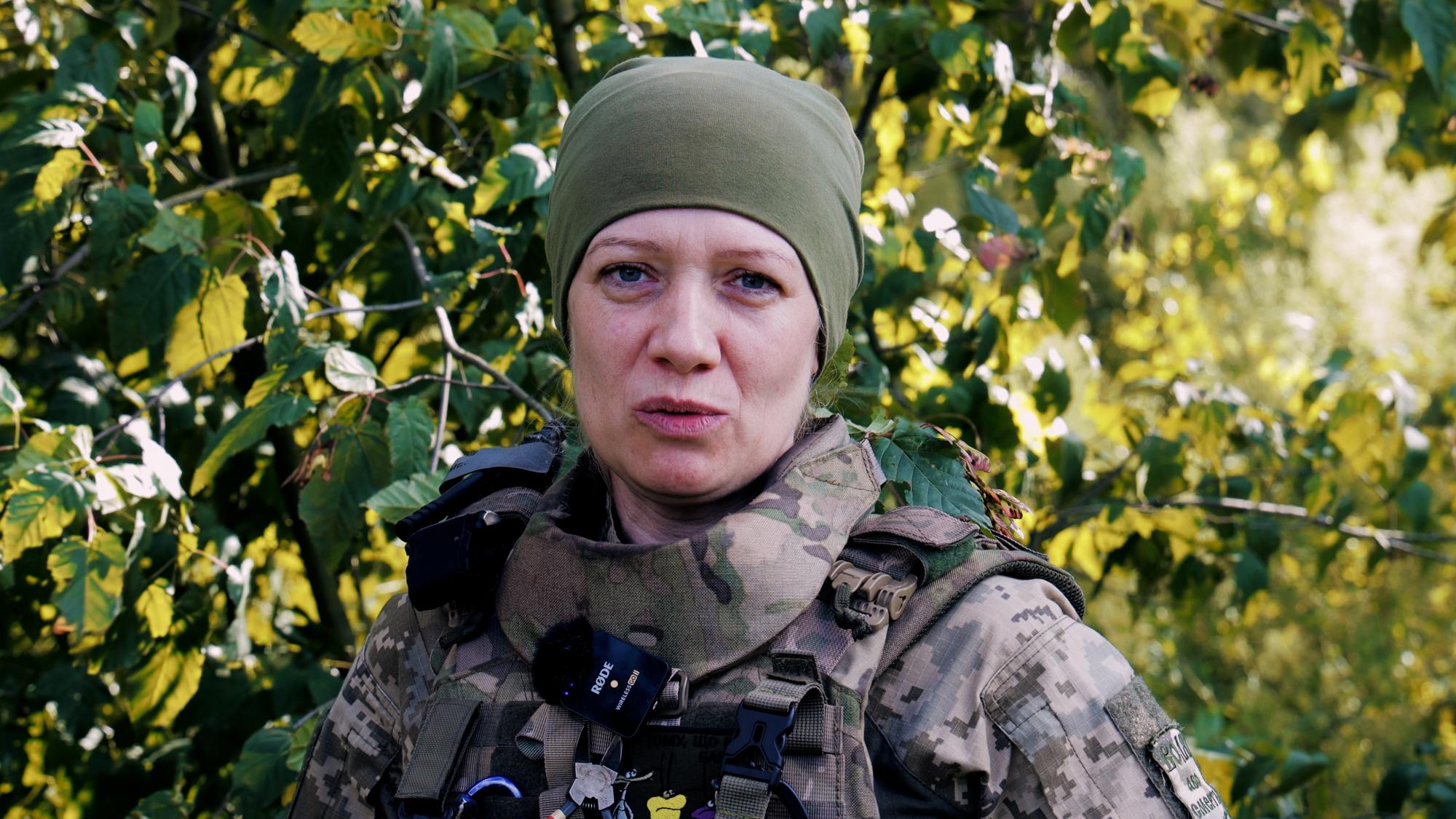 For some reason, it is believed that men are more capable of fighting than women. But in reality, this is not the case, says the defender (photo: RBC-Ukraine).
For some reason, it is believed that men are more capable of fighting than women. But in reality, this is not the case, says the defender (photo: RBC-Ukraine).
For Ostara, the main motive for her service in the army is to replace young people on the front lines. She believes that older people should be at war. Those who have already raised children, who have life experience.
"I feel very sorry for young men. They are our future. That's why I came here, so that they would have a chance to live."
Liliia, call sign Liuksa: young frontline medic
Liliia, call sign Liuksa, is the youngest in our report, who signed a contract at the age of 20. Her father had been fighting for Ukraine since 2014. When he was killed in action, the girl decided to continue his path.
"My father is gone. I think, 'I have to go.' I lived with the idea that I was preparing myself to be ready and understand something. Even when I joined my first unit, I came in and already had some understanding of the medical field because I had taken many courses in civilian life," says Liliia.
When she came to the military registration and enlistment office with her documents and a referral from the brigade, they were surprised that a fragile 20-year-old girl was going into the military for a combat position. The Territorial Recruitment Center employees tried to persuade Liuksa to take a rear position, but she made it clear to everyone that she was not interested in that. The only thing left was the most important part—telling her loved ones about her decision.
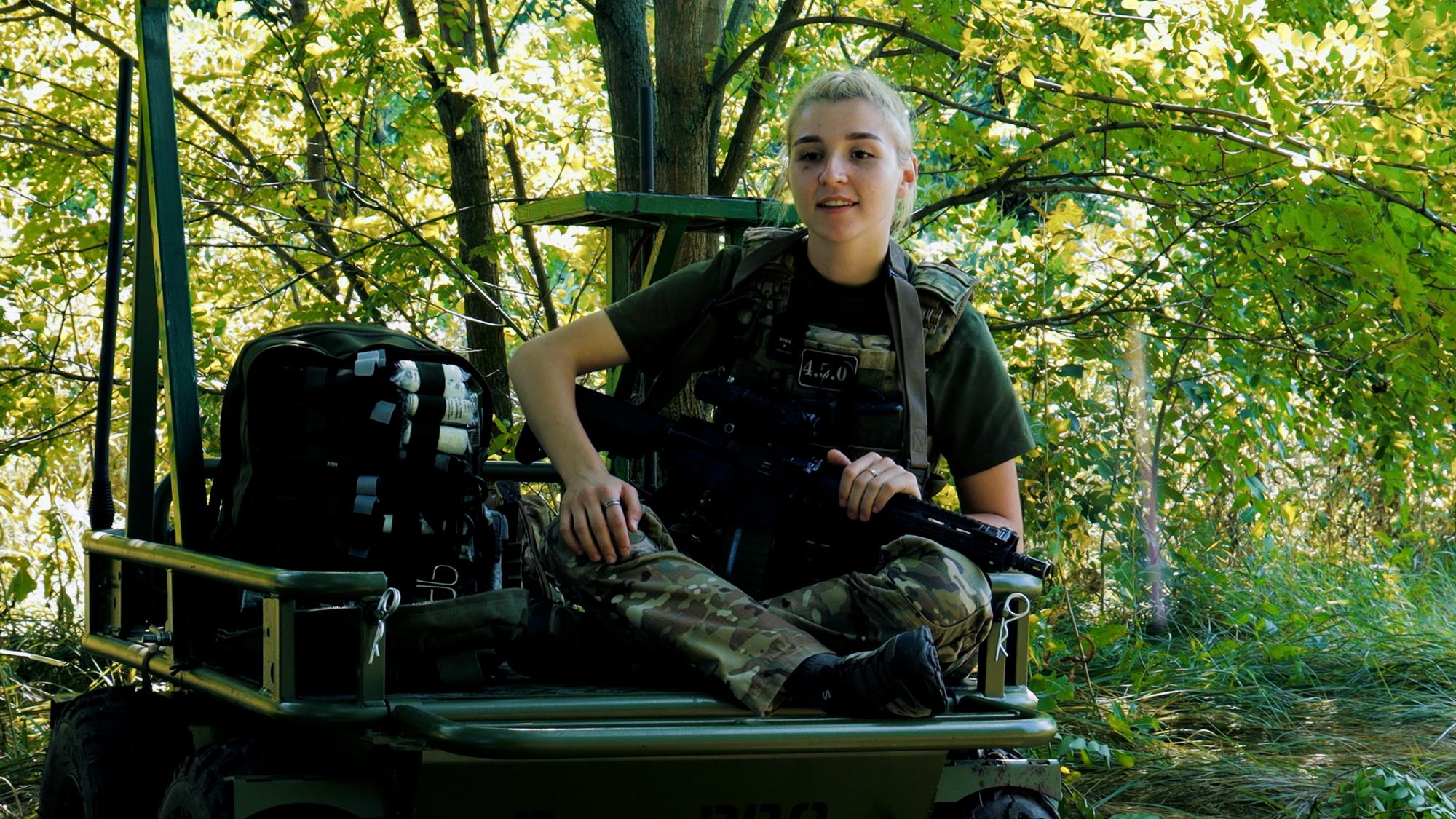 Liuksa signed a contract when she was 20 years old (photo: RBC-Ukraine)
Liuksa signed a contract when she was 20 years old (photo: RBC-Ukraine)
"When I knew that I was ready both physically and mentally, I began to prepare my mother gradually. We were at my father's grave. And then I told her, 'Mom, I'm signing a contract and leaving in a week.' My mom asked, 'Where?', and I said, 'To war,'" the girl recalls with a smile.
Her first trip out was unforgettable. They were evacuating a soldier with a gunshot wound to the back. Any movement could kill him. But what stuck in the girl's memory most were the soldier's eyes.
"He was bleeding heavily, and every second counted. And it was this situation that I remember as the beginning of my combat career, because I will never forget his eyes. When you see your first wounded soldier, and somewhere in the background, explosions and drones are flying, you don't care about anything else. You only think about him surviving," Liliia tells.
Liliia explains that the hardest part of her job is not the physical labor and fatigue, but rather the moral aspect. After all, every comrade you sit and talk with today, drinking coffee, could be wounded in your arms tomorrow.
"Over time, your psyche gets used to loss, as cynical as that may sound. And that's probably the hardest part. Nothing else scares me. I've toughened myself up so as not to disgrace myself in front of the guys. And when we were on our first missions, I psychologically prepared myself so that I was afraid to be afraid," Liliia explains.
Liuksa not only saves her comrades in battle, but also monitors their health, teaches tactical medicine, and makes sure that the first aid kits have everything necessary in case of injury. As soon as the girl is told that a new person is joining the unit, she immediately takes a first aid kit and goes to meet them.
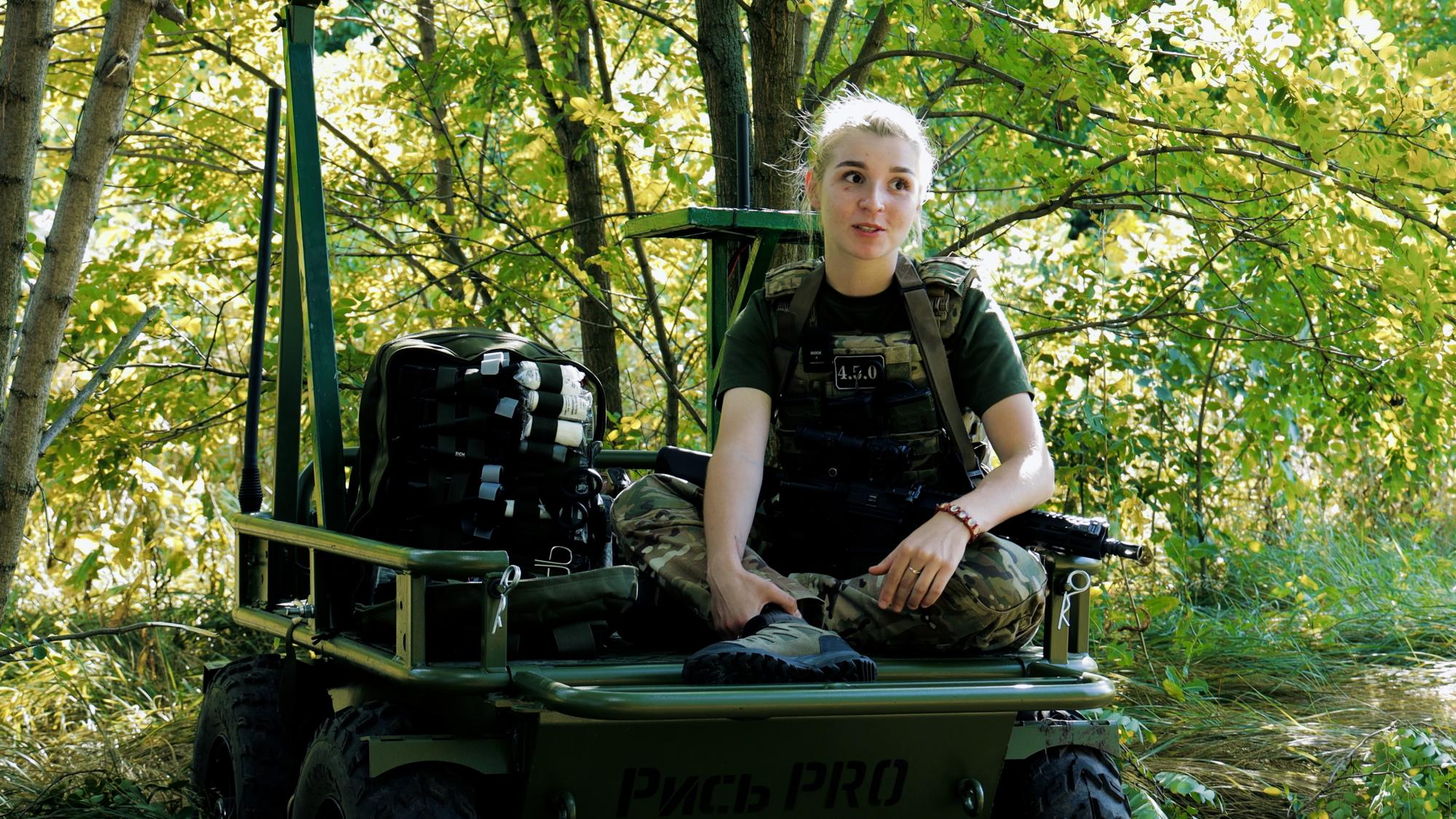 The girl decided to follow in her father's footsteps and join the Armed Forces of Ukraine (photo: RBC-Ukraine)
The girl decided to follow in her father's footsteps and join the Armed Forces of Ukraine (photo: RBC-Ukraine)
"I immediately find out whether there were any injuries, based on the decision of the Military Medical Commission. And I immediately say, 'Here is your first aid kit. We will teach you how to use it so that you can apply it at a critical moment in your life.' And they are usually very surprised at first," Liuksa says.
The girl says that, of course, she has the option not to serve, but she understands that the price is too high. Her family has already lost her father, and now her mother is most worried about not losing her daughter as well.
"I am doing this so that I will not be ashamed later. I will look back, and I will not be ashamed to look myself or my children in the eye. I am fighting for those who are not fighting because they have already died or been wounded. And I am fighting so that future generations will not have to fight," Liliia explains.
The medic recalls a moment in 2014 when she drew pictures for her father and sent them to him in the ATO zone. Now, 11 years later, she is receiving the same kind of drawings.
"Honestly, the last thing I want is for some girl who is sending me drawings now to sit here in 10 years and say that everyone has to fight. That's the last thing I want, honestly. That's why I'm here," concludes Liuksa.

